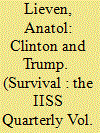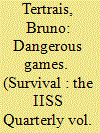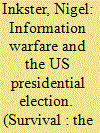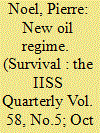|
|
|
Sort Order |
|
|
|
Items / Page
|
|
|
|
|
|
|
| Srl | Item |
| 1 |
ID:
147508


|
|
|
|
|
| Summary/Abstract |
On 23 June 2016, the British electorate defied the expectations of political leaders, financial markets and foreign allies by voting to withdraw from the European Union. Political shock and market upheaval followed. Theresa May replaced David Cameron as prime minister, the opposition Labour party began a leadership contest and the future status of those areas of the United Kingdom (Scotland, Northern Ireland, London and even Gibraltar) that voted to ‘Remain’ was thrown into doubt. The ‘Leave’ campaign hailed its 51.9% share of the vote as the declaration of Britain’s ‘Independence Day’
|
|
|
|
|
|
|
|
|
|
|
|
|
|
|
|
| 2 |
ID:
147512


|
|
|
|
|
| Summary/Abstract |
Israel’s security doctrine has traditionally distinguished between routine threats (low-intensity attacks by state armies or non-state organisations) and fundamental threats (high-intensity offensives by state armies). It has paid much less attention to the middle ground: the medium-intensity threat. That threat has grown in the wake of changes to the priorities of some Arab states; reductions in the military capabilities of others; and the emergence of non-state organisations that have acquired some state capabilities and that have successfully combined guerrilla and terror tactics (irregular warfare) with more conventional practices (regular warfare). Indeed, medium-intensity warfare is now the strategic focus of some of Israel’s active enemies. The country’s security doctrine must address this grey area, first by defining it, and then by identifying the optimal strategies and tactics that will be required to combat it.
|
|
|
|
|
|
|
|
|
|
|
|
|
|
|
|
| 3 |
ID:
147504


|
|
|
|
|
| Summary/Abstract |
Hillary Clinton and Donald Trump exemplify – in Trump’s case, to the point of caricature – contemporary versions of what I have previously called the thesis and antithesis of American nationalism.1 Both of these traditions have undergone important changes over the years in response to social, cultural and demographic shifts. Nevertheless, both also embody very old strains of American political culture, stretching back, in some cases, to the foundation of the republic and beyond. The contest between the new forms of these old traditions is likely to define politics in the United States for many years to come.
|
|
|
|
|
|
|
|
|
|
|
|
|
|
|
|
| 4 |
ID:
147511


|
|
|
|
|
| Summary/Abstract |
Cryptography has gone mainstream. Now more than ever, encryption is used by ordinary citizens, often without their knowledge, and is a subject of national debate. Intelligence and law-enforcement officials warn of the dangers of messages they cannot read. Presidents and prime ministers weigh in on the way cryptography shapes the balance between liberty and security. The Edward Snowden revelations drive encryption-related coverage in major newspapers, even as the technology is rolled out by increasing numbers of companies over government objections. All told, it may be the most international attention a mathematical concept has received since the space race.
|
|
|
|
|
|
|
|
|
|
|
|
|
|
|
|
| 5 |
ID:
147513


|
|
|
| 6 |
ID:
147510


|
|
|
|
|
| Summary/Abstract |
The decision by British voters to leave the European Union coincides with improving relations between Europe and Iran. Since the 1979 Islamic Revolution, Iran’s relationship with Europe’s major powers has been characterised by periods of economic cooperation followed by near-complete disengagement. The nuclear deal struck between Iran and world powers in July 2015 – which the EU played a major role in negotiating – removed the economic sanctions that since 2006 have stood in the way of deeper ties. A new chapter in Iranian–European relations has already begun. But the impending exit of the United Kingdom from the EU further paves the way for a new paradigm in Europe’s relationship with Iran: strategic EU–Iran engagement that is separate from, but parallel to, high-level UK–Iran talks.
|
|
|
|
|
|
|
|
|
|
|
|
|
|
|
|
| 7 |
ID:
147505


|
|
|
|
|
| Summary/Abstract |
On Friday 22 July 2016, some 20,000 emails stolen from the servers of the Democratic National Committee (DNC) were published on the WikiLeaks website. The emails, a selection of which had already been passed to American media organisations, were to varying degrees embarrassing to the DNC, in particular by demonstrating that the party organisation was biased in favour of Hillary Clinton at the expense of Bernie Sanders, her rival for the Democratic presidential nomination. The immediate consequence of the leaks was the resignation of DNC chairperson Debbie Wasserman Schultz. But the ripples of this incident, which revealed no evidence of significant wrongdoing within the Democratic Party, spread far and wide, raising serious questions about the extent to which the United States presidential election had become weaponised in the context of a wider geopolitical confrontation.
|
|
|
|
|
|
|
|
|
|
|
|
|
|
|
|
| 8 |
ID:
147509


|
|
|
|
|
| Summary/Abstract |
The oil industry has gone through a constant process of change since the oil-price shocks of the 1970s, but one key, structural feature has endured. The sovereign owners of the cheapest resources on earth – notably Saudi Arabia and other Gulf producers – have exploited them much less intensively than would have been the case under a competitive market structure. Because of the relative unresponsiveness of both supply and demand for oil to changes in price, the Saudi-led oil cartel of low-cost Gulf producers has been able to withhold cheap oil from the market, shifting marginal supply to more expensive oil fields. Hence, for decades, oil has been sold for more than it would have cost in a competitive industry. This strategy has generated huge economic rents for the industry’s key players, including Gulf sovereigns and publicly traded oil companies. Today, however, this structure is being eroded, and may even be collapsing before our eyes.
|
|
|
|
|
|
|
|
|
|
|
|
|
|
|
|
| 9 |
ID:
147507


|
|
|
|
|
| Summary/Abstract |
A few short years ago, in most of the NATO countries that still hosted American tactical nuclear weapons, public attitudes towards those weapons were becoming increasingly negative. In 2009, Germany began seeking their withdrawal; the following year, Belgium and the Netherlands, along with some other non-weapons-hosting NATO allies, followed suit in calling for a debate on the future of the weapons and on disarmament goals. Italian disarmament advocates campaigned against the weapons hosted in their country. There was also some debate in Turkey,1 although the weapons there were mostly seen as providing an assurance of assistance from the United States in the event of a security threat, and tethering Turkey to the European mainland.
|
|
|
|
|
|
|
|
|
|
|
|
|
|
|
|
| 10 |
ID:
147506


|
|
|
|
|
| Summary/Abstract |
From abroad, it must look as though America has lost its collective mind. For those who rely on the United States’ protection, it must unsettle to be reminded how wide open the American political system truly is. For those who care about effective governance, it might mystify that 13 million Republicans cast their ballots in favour of an erratic novice instead of a dozen or so experienced governors and congressmen. For those doubtful of America’s decency, Republican nominee Donald Trump’s behaviour and the belligerence of many of his supporters must be an affirmation. Republicans are seemingly in thrall to a candidate who repudiates both their principles and their policies.
|
|
|
|
|
|
|
|
|
|
|
|
|
|
|
|
|
|
|
|
|